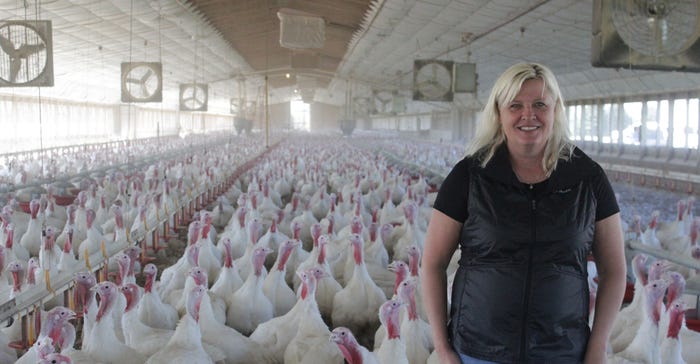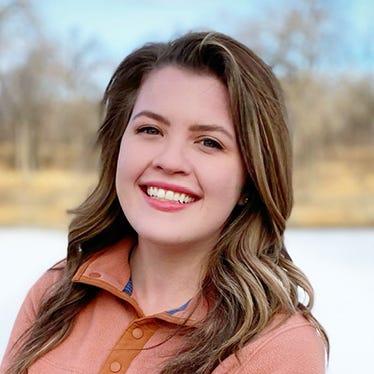
Minnesota might be the No. 1 turkey-producing state in the U.S., but North Dakota produces its fair share — with nine farms turning out a million turkeys yearly. One of these turkey growers is Sharlene Wittenburg and her family in Wyndmere, N.D.
“I grew up on a turkey farm in northern Minnesota, and I ran a farm for my father before I married my husband, Carl. We got married in North Carolina, and my husband worked in the industry there, and then we came back to North Dakota and bought this farm in 2009,” Wittenburg says.
An active member of the turkey industry, Wittenburg is a past president of the North Dakota Turkey Federation and works to showcase production practices of turkey farms to consumers.
“We raise conventional and organic, and also partner with the GAP [Global Animal Partnership] program, which focuses on welfare standards and management of the birds,” she says.
Their farm runs seasonally, February to November, each year. “In February, we start up the group barns, and that’s when we have our first birds come in. We put 13,500 in the start barn, and then in four and a half to five weeks, we move them into grow-outs. Two weeks later, the barn has to be ready for the next batch of poults to come in.”
“We keep them all together as a barn group, and continue this process” into September. “Some growers will start another flock in August. But for our farm, we need to have the proper square footage and room for the birds, so we’re wrapping down about now,” she says.
Keeping birds together is a part of their farm’s biosecurity plan to maintain bird health. “It’s challenging as a producer to always keep birds healthy sometimes. We stay on top of everything from the heat and temperature, to making sure the computer systems work on our curtains and doors, to keeping predators out and the birds stress-free,” she says.
The Wittenburg farm works closely with the grower-owned processing plant Northern Pride, started by Wittenburg’s father, Glen Jaenicke.
“Another processor left the northern Minnesota area, so there was no place for growers to send their birds. My dad got 32 growers together and got the money to start the plant, and it’s now been running 35 years,” she says.
Wittenburg also serves on the plants board of directors. She says there are many turkey growers who are on contracts with large producers, and there are minimal opportunities to get in with a grower-owned plant.
“There are 200 and some employees there, and it opens in late April to start getting birds in and processed,” she says.
Opportunities in organic
The Wittenburgs’ farm is home to both organic and conventionally raised birds, but the Wittenburgs do their best to raise everything as organically as possible.
“Even though they don’t have to be, we try to raise them the same as the organic birds and just treat them if we need to,” she says.
As USDA organic growers, they submit grower plans and are audited to ensure that all inputs including feed and bedding are organic in nature. “We submit the plans of how we’re going to grow organic birds, and they have auditors come out and take a look at everything, and if there is a question, they let us know. It’s a very stringent process,” Wittenburg says.
In addition to being certified organic, their farm works with Global Animal Partnership program, which works to ensure animal welfare standards are being met. Through the program, there are levels 1 through 5-plus, and the Wittenburg farm is a GAP 3.
“A third-party audit comes out to ensure we’re handling the birds in a safe and humane way. That we’re not feeding them antibiotics; everything in their program is for the benefit of the birds,” she says.
Organic and GAP-certified birds sell for a higher premium, increasing their farm profit. “Also, with the GAP program, we have to have the same amount of square footage outside the barns as inside, so the birds are “pasture-raised” in this program. For our farm and our birds, we’re not able to be certified above a GAP 3 because it wouldn’t make economic sense,” she says.
Turkey federation
With her past and current work with the turkey federation, Wittenburg has had their family birds on both state and national stages. In 2017, the Wittenburgs presented turkeys to former President Donald Trump for the presidential pardon from their family farm in northern Minnesota. That same year they had birds pardoned by both North Dakota Gov. Doug Burgum and Minnesota Gov. Mark Dayton.
Aside from bringing awareness of the turkey industry to consumers, a large part of the federation’s work comes from staying informed on what’s happening within legislation, Wittenburg says.
“If there are big rules and rule changes coming, we stay informed on what is happening both nationally and state side and work to make sure that all producers know what requirements they might have to follow,” she says. “We’ve had a big push for revied biosecurity plans and getting them submitted through the state, so making sure we answer questions and help producers get those done.”
They also put on the North Dakota Poultry Industries Convention each year. “If we’re able to hold it this year, it will be the 75th year. It’s not just for North Dakota; we have South Dakota and Minnesota and more from around the region that come,” Wittenburg says.
For more information about turkey production, check out the National Turkey Federation.
About the Author(s)
You May Also Like






